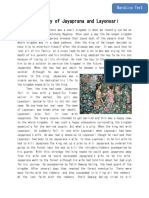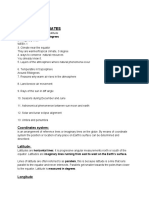0 ratings0% found this document useful (0 votes)
87 views24TH Century
24TH Century
Uploaded by
June Delfino Delute1. Virgilio Serrano, a wealthy student, hosts a dinner party for friends on the eve of his suicide.
2. The dinner is held in Virgilio's lavishly restored family home, one of the few buildings that survived the bombardment of Manila.
3. During dinner, Virgilio seems to glow with knowledge and success without apparent effort, impressing his classmates. However, that night he would take his own life.
Copyright:
© All Rights Reserved
Available Formats
Download as PPTX, PDF, TXT or read online from Scribd
24TH Century
24TH Century
Uploaded by
June Delfino Delute0 ratings0% found this document useful (0 votes)
87 views31 pages1. Virgilio Serrano, a wealthy student, hosts a dinner party for friends on the eve of his suicide.
2. The dinner is held in Virgilio's lavishly restored family home, one of the few buildings that survived the bombardment of Manila.
3. During dinner, Virgilio seems to glow with knowledge and success without apparent effort, impressing his classmates. However, that night he would take his own life.
Original Description:
sss
Original Title
24TH CENTURY
Copyright
© © All Rights Reserved
Available Formats
PPTX, PDF, TXT or read online from Scribd
Share this document
Did you find this document useful?
Is this content inappropriate?
1. Virgilio Serrano, a wealthy student, hosts a dinner party for friends on the eve of his suicide.
2. The dinner is held in Virgilio's lavishly restored family home, one of the few buildings that survived the bombardment of Manila.
3. During dinner, Virgilio seems to glow with knowledge and success without apparent effort, impressing his classmates. However, that night he would take his own life.
Copyright:
© All Rights Reserved
Available Formats
Download as PPTX, PDF, TXT or read online from Scribd
Download as pptx, pdf, or txt
0 ratings0% found this document useful (0 votes)
87 views31 pages24TH Century
24TH Century
Uploaded by
June Delfino Delute1. Virgilio Serrano, a wealthy student, hosts a dinner party for friends on the eve of his suicide.
2. The dinner is held in Virgilio's lavishly restored family home, one of the few buildings that survived the bombardment of Manila.
3. During dinner, Virgilio seems to glow with knowledge and success without apparent effort, impressing his classmates. However, that night he would take his own life.
Copyright:
© All Rights Reserved
Available Formats
Download as PPTX, PDF, TXT or read online from Scribd
Download as pptx, pdf, or txt
You are on page 1of 31
THE WOMAN AND THE SQUIRREL
One day a woman went out to find water. She had no
water to drink, because all the streams were dried up.
As she went along, she saw some water in a leaf. She
drank it, and washed her body. As soon as she had
drunk the water, her head began to hurt. Then she
went home, spread out a mat, lay down on it, and
went to sleep. She slept for nine days. When she woke
up, she took a comb and combed her hair. As she
combed it, a squirrel-baby came out from her hair.
After the baby had been in the house one week, it
began to grow and jump about. It staid up under the
roof of the house.
One day the Squirrel said to his mother, “O mother! I
want you to go to the house of the Datu who is called
‘sultan,’ and take these nine kamagi and these nine
finger-rings to pay for the sultan’s daughter, because I
want to marry her.”
Then the mother went to the sultan’s house and remained
there an hour. The sultan said, “What do you want?”
The woman answered, “Nothing. I came for betelnuts.”
Then the woman went back home.
The Squirrel met her, and said, “Where are my nine
necklaces?”
“Here they are,” said the woman.
But the Squirrel was angry at his mother, and bit her with
his little teeth.
Again he said to his mother, “You go there and take the
nine necklaces.”
So the woman started off again. When she reached the
sultan’s house, she said to him, “I have come with these nine
necklaces and these nine finger-rings that my son sends to
you.”
“Yes,” said the sultan; “but I want my house to become gold,
and I want all my plants to become gold, and everything I have
to turn into gold.”
But the woman left the presents to pay for the sultan’s
daughter. The sultan told her that he wanted his house to be
turned into gold that very night. Then the woman went back
and told all this to her son. The Squirrel said, “That is good,
my mother.”
Now, when night came, the Squirrel went to the sultan’s
house, and stood in the middle of the path, and called to his
brother, the Mouse, “My brother, come out! I want to see you.”
Then the great Mouse came out. All the hairs of his coat
were of gold, and his eyes were of glass.
The Mouse said, “What do you want of me, my brother
Squirrel?”
“I called you,” answered the Squirrel, “for your gold coat. I
want some of that to turn the sultan’s house into gold.”
Then the Squirrel bit the skin of the Mouse, and took off
some of the gold, and left him. Then he began to turn the
sultan’s things into gold.
First of all, he rubbed the gold on the betel-nut trees of the sultan;
next, he rubbed all the other trees and all the plants; third, he rubbed
the house and all the things in it. Then the sultan’s town you could see
as in a bright day. You would think there was no night there—always
day.
All this time, the sultan was asleep. When he woke up, he was so
frightened to see all his things, and his house, of gold, that he died in
about two hours.
Then the Squirrel and the daughter of the sultan were married. The
Squirrel stayed in her father’s home for one month, and then they
went to live in the house of the Squirrel’s mother. And they took from
the sultan’s place, a deer, a fish, and all kinds of food. After the sultan’s
daughter had lived with the Squirrel for one year, he took off his coat
and became a Malaki T’oluk Waig.
QUESTION # 1
1. Who are the characters of the
Story?
Answer
The characters of the Story
a. The Woman
b. The Squirrel
c. The Sultan
d. The mouse
e. Daughter of Sultan/ Princess
QUESTION # 2
What are the gifts that the squirrel
would like to give the daughter of
Sultan?
Answer
The gifts that the squirrel would like to
give the daughter of Sultan are the
following:
a. nine kamagi
b.nine finger-rings
QUESTION # 3
What are the wishes of the
Sultan in exchange of the
marriage between the squirrel
and his daughter?
Question No. 3
The wishes of the Sultan in exchange of the
marriage between the squirrel and his daughter
are the following:
1. house to become gold,
2. plants to become gold,
3. everything to turn into gold.”
QUESTION # 4
How did the Squirrel made
the wish of the Sultan come
true?
Answer
Then the Squirrel bit the skin of the Mouse,
and took off some of the gold, and left him.
Then he began to turn the sultan’s things into
gold.
First of all, he rubbed the gold on the betel-
nut trees of the sultan; next, he rubbed all
the other trees and all the plants; third, he
rubbed the house and all the things in it.
QUESTION # 5
After the sultan’s daughter
had lived with the Squirrel for
one year, what happened to
squirrel after he took off the
coat?
Answer
After the sultan’s daughter had
lived with the Squirrel for one
year, he took off his coat and
became a Malaki T’oluk Waig.
AT WAR’S END: AN
ELEGY
by Rony V. Diaz
1. THE DINNER PARTY
THE evening before he killed himself, Virgilio Serrano
gave a dinner party. He invited five guests—friends and
classmates in university— myself included. Since we
lived on campus in barracks built by the U.S. Army, he
sent his Packard to fetch us.
Virgilio lived alone in a pre-war chalet that belonged
to his family. Four servants and a driver waited on him
hand and foot. The chalet, partly damaged, was one of
the few buildings in Ermita that survived the
bombardment and street fighting to liberate Manila.
It had been skillfully restored; the broken lattices,
fretwork, shell windows and wrought iron fence had
been repaired or replaced at considerable expense.
A hedge of bandera española had been planted and
the scorched frangipani and hibiscus shrubs had
been pruned carefully. Thus, Virgilio’s house was an
ironic presence in the violated neighborhood.
He was on the porch when the car came to a
crunching halt on the graveled driveway. He shook
our hands solemnly, then ushered us into the living
room. In the half-light, everything in the room
glowed, shimmered or shone. The old ferruginous
narra floor glowed. The pier glass coruscated. The
bentwood furniture from the house in Jaen looked as
if they had been burnished. In a corner, surrounded by
bookcases, a black Steinway piano sparkled like glass.
Virgilio was immaculate in white de hilo pants and
cotton shirt. I felt ill at ease in my surplus khakis and
combat boots.
We were all in our second year. Soon we will be on
different academic paths—Victor in philosophy;
Zacarias in physics and chemistry; Enrique in
electrical engineering; and Apolonio, law. Virgilio and I have
both decided to make a career in English literature. Virgilio was
also enrolled in the Conservatory and in courses in the
philosophy of science.
We were all in awe of Virgilio. He seemed to know everything.
He also did everything without any effort. He had not been seen
studying or cramming for an exam in any subject, be it history,
anthropology or calculus. Yet the grades that he won were only a
shade off perfection.
HE and I were from the same province where our families
owned rice farms except that ours was tiny, a hundred hectares,
compared to the Serrano’s, a well-watered hacienda that
covered 2,000 hectares
ofland as flat as a table.
The hacienda had been parceled out to eleven inquilinos who
together controlled about a thousand tenants. The Serranos had a
large stone house with a tile roof that dated back to the 17th century
that they used during the summer months. The inquilinos dealt with
Don Pepe’s spinster sister, the formidable Clara, who knew their
share of the harvest to the last chupa. She was furthermore in
residence all days of the year.
Virgilio was the only child. His mother was killed in a motor
accident when he was nine. Don Pepe never remarried. He became
more and more dependent on Clara as he devoted himself to
books, music and conversation. His house in Cabildo was a salon
during
the years of the Commonwealth. At night, spirited
debates on art, religion language, politics and world
affairs would last until the first light of dawn. The guests
who lived in the suburbs were served breakfasts before
they drove off in their runabouts to Sta. Cruz, Ermita or
San Miguel. The others stumbled on cobblestones on
their way back to their own mansions within the
cincture of Intramuros.
In October, Quezon himself came for merienda. He had
just appointed General MacArthur field marshal of the
Philippine Army because of disturbing news from
Nanking and Chosun. Quezon cursed the Americans
for not taking him in their confidence. But like most gifted
politicians, he had a preternatural sense of danger.
“The Japanese will go to war against the Americans before this
year is out, Pepe,” Quezon rasped, looking him straight in the eye.
This was the reason the Serranos prepared to move out of
Manila. As discreetly as possible, Don Pepe had all his personal
things packed and sent by train to Jaen. He stopped in
viting his friends. But when the Steinway was crated and loaded
on a large truck that blocked the street completely, the neighbors
became curious. Don Pepe dissembled saying that he had decided
to live in the
province for reasons of health, “at least until after
Christmas.”
Two weeks later, he suffered a massive stroke and died.
The whole town went into mourning. His remains were
interred, along with his forebears, in the south wall of the
parish church. A month later, before the period of mourning
had ended, Japanese planes bombed and strafed Clark Field.
Except for about three months in their hunting lodge in the
forests of Bongabong (to escape the rumored rapine that
was expected to be visited on the country by the yellow
horde. Virgilio and Clara spent the war years in peace and
comfort in their ancestral house in Jaen.
Clara hired the best teachers for Virgilio. When food
became scare in the big towns and cities, Clara put up
their families in the granaries and bodegas of
the hacienda so that they would go on tutoring Virgilio
in science, history, literature, mathematics, philosophy
and English. After his lessons, he read and practiced on
the piano. He even learned to box and to fence
although he was always nauseated by the ammoniac
smell of the gloves and mask. Despite Clara’s best
effort, she could not find new boxing gloves and fencing
equipment. Until she met Honesto Garcia.
Honest Garcia, was a petty trader in rice who had
who had mastered the intricate mechanics of the black market. He
dealt in anything that could be moved but he became rich by buying
and selling commodities such as soap, matches, cloth and quinine
pills.
Garcia maintained a network of informers to help him align
supply and demand—and at the same time collect intelligence for
both the Japanese Army and the Hukbalahap.
One of his informers told him about Clara Serrano’s need for a
pair of new boxing gloves and protective gear for escrima. He
found these items. He personally drove in his amazing old car
to Jaen to present them to Clara, throwing in a French epée
that was still in its original case for good measure. He refused
payment but asked to be allowed to visit.
Honesto Garcia was the son of a kasama of the
Villavicencios of Cabanatuan. By hard work and
numerous acts of fealty, his father became
an inquilino. Honesto, the second of six children,
however made up his mind very early that he would
break loose from farming. He reached the seventh
grade and although his father at that time had enough
money to send him to high school, he decided to
apprentice himself to a Chinese rice trader in Gapan.
His wage was a few centavos a day, hardly enough for
his meals, but after two years, he knew enough about
the business to ask his father for a loan of PhP 60
to set himself up as a rice dealer. And then the war
broke out.
Honesto was handsome in a rough-hewn way. He
tended to fat but because he was tall he was an
imposing figure. He was unschooled in the social
graces; he preferred to eat, squatting before
a dulang, with his fingers. Despite these deficiencies,
he exuded an aura of arrogance and self-confidence.
It was this trait that attracted Clara to him. Clara
had never known strong-willed men, having grown
up with effete persons like Don Pepe and compliant
men like the inquilinos who were always silent in her
presence.
When Clara told Virgilio that Honesto had proposed
and that she was inclined to accept, Virgilio was not
surprised. He also had grown to like Honesto who
always came with unusual gifts. Once, Honesto gave
him a mynah that Virgilio was able to teach within a
few days to say “Good morning. How are you today?”
The wedding took place in June of the second year of
the war. It was a grand affair. The church and the house
Were decked in flowers. The inquilinos fell over each
You might also like
- Crochet Snoopy Dog Amigurumi Free PatternDocument5 pagesCrochet Snoopy Dog Amigurumi Free PatternAmanda Daniela100% (8)
- Care of Mother, Child, Adolescent (Autosaved)Document23 pagesCare of Mother, Child, Adolescent (Autosaved)Shing Mae Marie100% (10)
- Teaching ProfessionDocument12 pagesTeaching ProfessionAnonymous E2A6hn4U100% (2)
- Parental Involvement and Pupils AcademicDocument153 pagesParental Involvement and Pupils AcademicKiko HuitNo ratings yet
- The Woman and The Squirrel - Philippine LiteratureDocument2 pagesThe Woman and The Squirrel - Philippine LiteratureMac Jhon Lee LimbagaNo ratings yet
- Myths and Folk-lore of Ireland: 20 Irish and Celtic Myths and LegendsFrom EverandMyths and Folk-lore of Ireland: 20 Irish and Celtic Myths and LegendsNo ratings yet
- English Assignment Ix ADocument43 pagesEnglish Assignment Ix AYosi Haifa PutriNo ratings yet
- 12 Narrative TextDocument12 pages12 Narrative TextandioddaNo ratings yet
- Black Stain Spreaded On The Water, As A Big Black Cloack Which Had The Sea Gone IntoDocument4 pagesBlack Stain Spreaded On The Water, As A Big Black Cloack Which Had The Sea Gone IntoCesar QuilumbaquinNo ratings yet
- JACKAL OR TIGER - an old fairy tale from India: Baba Indaba’s Children's Stories - Issue 283From EverandJACKAL OR TIGER - an old fairy tale from India: Baba Indaba’s Children's Stories - Issue 283No ratings yet
- Copia de Puerto Rican Myth, Legend, Fairy Tale, and FolktaleDocument8 pagesCopia de Puerto Rican Myth, Legend, Fairy Tale, and Folktalerojo0712drmNo ratings yet
- Sleeping BeautyDocument5 pagesSleeping BeautyMargie PaderesNo ratings yet
- Tugas B InggDocument13 pagesTugas B InggArmita DewiNo ratings yet
- Olive the Lionheart: Lost Love, Imperial Spies, and One Woman's Journey into the Heart of AfricaFrom EverandOlive the Lionheart: Lost Love, Imperial Spies, and One Woman's Journey into the Heart of AfricaRating: 3.5 out of 5 stars3.5/5 (22)
- THE SLEEPING BEAUTY - the Classic Children's Fairy Tale: Baba Indaba’s Children's Stories - Issue 328From EverandTHE SLEEPING BEAUTY - the Classic Children's Fairy Tale: Baba Indaba’s Children's Stories - Issue 328No ratings yet
- MAyon Volacano LegendDocument6 pagesMAyon Volacano Legendn_cabaracaNo ratings yet
- Reading 1 My Grandpa's Funeral in TorajaDocument6 pagesReading 1 My Grandpa's Funeral in TorajahendriNo ratings yet
- ALLERLEIRAUH or the Many-Furred Creature - A European Children’s Story: Baba Indaba Children's Stories - Issue 167From EverandALLERLEIRAUH or the Many-Furred Creature - A European Children’s Story: Baba Indaba Children's Stories - Issue 167No ratings yet
- Narrative Text ItuDocument4 pagesNarrative Text Itudennisdevee13No ratings yet
- Tower of Silence: There were things at Teind House that must be kept concealed from the prying world at all costs . . .From EverandTower of Silence: There were things at Teind House that must be kept concealed from the prying world at all costs . . .Rating: 4 out of 5 stars4/5 (45)
- myths-and-folk-lore-of-irelandDocument208 pagesmyths-and-folk-lore-of-irelandMárcio CelsoNo ratings yet
- Sleeping Beauty - Bi̇hter YilmazDocument13 pagesSleeping Beauty - Bi̇hter YilmazZehra VeyselNo ratings yet
- The Princess and The Pea - Exclusive ReleaseDocument15 pagesThe Princess and The Pea - Exclusive ReleaseAtria Books100% (2)
- HOW IAN DIREACH GOT THE BLUE FALCON - A Scottish Children’s Story: Baba Indaba’s Children's Stories - Issue 371From EverandHOW IAN DIREACH GOT THE BLUE FALCON - A Scottish Children’s Story: Baba Indaba’s Children's Stories - Issue 371No ratings yet
- Pricess LiteratureDocument5 pagesPricess LiteratureImmediateFalcoNo ratings yet
- AugustDocument19 pagesAugustapi-68108609No ratings yet
- A TALE OF TONTLAWALD - An Estonian Fairy Tale: Baba Indaba Children's Stories - Issue 88From EverandA TALE OF TONTLAWALD - An Estonian Fairy Tale: Baba Indaba Children's Stories - Issue 88No ratings yet
- Ifan Aryandi Xiips2 1. Jenis Teks: Short Story Fable Fable Short Story Short StoryDocument4 pagesIfan Aryandi Xiips2 1. Jenis Teks: Short Story Fable Fable Short Story Short StoryIfan AryandiNo ratings yet
- 1919 Legends of Old Lushai by Sandy SDocument135 pages1919 Legends of Old Lushai by Sandy Stasneem.fatima97No ratings yet
- BRIAR ROSE - A European Fairy Tale: Baba Indaba’s Children's Stories - Issue 332From EverandBRIAR ROSE - A European Fairy Tale: Baba Indaba’s Children's Stories - Issue 332No ratings yet
- Jack and the Beanstalk英语故事Document37 pagesJack and the Beanstalk英语故事yannieNo ratings yet
- East O' the Sun and West O' the Moon & Other Norwegian Fairy TalesFrom EverandEast O' the Sun and West O' the Moon & Other Norwegian Fairy TalesRating: 4 out of 5 stars4/5 (38)
- The Choice: Nora: Hon, Wake Up. It's About To Rain. Sigmund: Oh No! I Have To Go and Fix The Leak On Our RoofDocument10 pagesThe Choice: Nora: Hon, Wake Up. It's About To Rain. Sigmund: Oh No! I Have To Go and Fix The Leak On Our RoofmarcNo ratings yet
- The Curse of The Seven Children: THERE Was Once A King and ADocument10 pagesThe Curse of The Seven Children: THERE Was Once A King and AidaidutNo ratings yet
- Fables Dan Fairy TaleDocument11 pagesFables Dan Fairy TaleSri DwiwatiNo ratings yet
- Weekly Home Learning Plan Week 1 - October 6, 2020Document3 pagesWeekly Home Learning Plan Week 1 - October 6, 2020June Delfino DeluteNo ratings yet
- DELUTE WHLP WEEK 3 4 DependabilityDocument7 pagesDELUTE WHLP WEEK 3 4 DependabilityJune Delfino DeluteNo ratings yet
- Weekly Home Learning Plan Week 1 - October 20, 2020Document3 pagesWeekly Home Learning Plan Week 1 - October 20, 2020June Delfino DeluteNo ratings yet
- Weekly Home Learning Plan Week 1 - October 20, 2020Document3 pagesWeekly Home Learning Plan Week 1 - October 20, 2020June Delfino DeluteNo ratings yet
- DELUTE WHLP WEEK 3 4 ReliabilityDocument8 pagesDELUTE WHLP WEEK 3 4 ReliabilityJune Delfino DeluteNo ratings yet
- Government Updates: COVID-19 - FAQ and ManualDocument1 pageGovernment Updates: COVID-19 - FAQ and ManualJune Delfino DeluteNo ratings yet
- G11-Generosity: Composite Sheet For First Semester Sy 2019-2020Document2 pagesG11-Generosity: Composite Sheet For First Semester Sy 2019-2020June Delfino DeluteNo ratings yet
- Senior High School Student Permanent Record: Republic of The Philippines Department of EducationDocument3 pagesSenior High School Student Permanent Record: Republic of The Philippines Department of EducationJune Delfino DeluteNo ratings yet
- Senior High School Student Permanent Record: Republic of The Philippines Department of EducationDocument3 pagesSenior High School Student Permanent Record: Republic of The Philippines Department of EducationJune Delfino DeluteNo ratings yet
- Senior High School Student Permanent Record: Republic of The Philippines Department of EducationDocument3 pagesSenior High School Student Permanent Record: Republic of The Philippines Department of EducationJune Delfino DeluteNo ratings yet
- Senior High School Student Permanent Record: Republic of The Philippines Department of EducationDocument3 pagesSenior High School Student Permanent Record: Republic of The Philippines Department of EducationJune Delfino DeluteNo ratings yet
- Loan Agreement and Promissory NoteDocument3 pagesLoan Agreement and Promissory NoteJune Delfino Delute100% (3)
- Adelina S. Macaraeg, Dpa: Epartment Head-Pediatric, Oncology and Pay Ward ServicesDocument2 pagesAdelina S. Macaraeg, Dpa: Epartment Head-Pediatric, Oncology and Pay Ward ServicesJune Delfino DeluteNo ratings yet
- Project Ni ClarkDocument13 pagesProject Ni ClarkJune Delfino DeluteNo ratings yet
- Lesson Plan: How Sports Is Related To Health Awareness?Document4 pagesLesson Plan: How Sports Is Related To Health Awareness?June Delfino DeluteNo ratings yet
- Davao City Special National High School Senior High Third Quarter Examination in Research in Daily Life Grade 11 Strictly No ErasureDocument4 pagesDavao City Special National High School Senior High Third Quarter Examination in Research in Daily Life Grade 11 Strictly No ErasureJune Delfino DeluteNo ratings yet
- SHS ExamEditedDocument2 pagesSHS ExamEditedJune Delfino DeluteNo ratings yet
- Personal Data SheetDocument8 pagesPersonal Data SheetJune Delfino DeluteNo ratings yet
- PEH11FINALDocument2 pagesPEH11FINALJune Delfino DeluteNo ratings yet
- Mapeh g7 4th ReviewerDocument3 pagesMapeh g7 4th ReviewerJune Delfino DeluteNo ratings yet
- U.P. LAW COMPLEX Publications: AvailableDocument8 pagesU.P. LAW COMPLEX Publications: AvailableJune Delfino DeluteNo ratings yet
- Ma BohemeDocument198 pagesMa BohemeJohn ValenteNo ratings yet
- R Politics Ban Results ADocument2,828 pagesR Politics Ban Results AAnonymous N4O7A5f9No ratings yet
- MCN Intra Partum Quiz QuestionsDocument20 pagesMCN Intra Partum Quiz QuestionsKyla CapituloNo ratings yet
- REVIEW Q4 Grade 7Document17 pagesREVIEW Q4 Grade 7CrimsonuuNo ratings yet
- Shakira: Shakila Shakira (Album) Shakira (Disambiguation) Spanish Name SurnameDocument23 pagesShakira: Shakila Shakira (Album) Shakira (Disambiguation) Spanish Name SurnameWidun SenilaNo ratings yet
- Brazil .pptxDocument12 pagesBrazil .pptxbeasophiasimas1No ratings yet
- Essay On Water ResourcesDocument4 pagesEssay On Water Resourcesb72hvt2d100% (2)
- 50 Year and COVID-19Document39 pages50 Year and COVID-19Pretty SweetNo ratings yet
- Abbasuddin AhmedDocument2 pagesAbbasuddin AhmedMd. Ashfaqur RhamanNo ratings yet
- Between Romanticism and Modernism Four Studies in the Music of the Later Nineteenth Century Carl Dahlhaus all chapter instant downloadDocument40 pagesBetween Romanticism and Modernism Four Studies in the Music of the Later Nineteenth Century Carl Dahlhaus all chapter instant downloadhattomischg0100% (3)
- 3 Biggest OBE Lucid Dream Mistakes PDFDocument11 pages3 Biggest OBE Lucid Dream Mistakes PDFGarb PoubNo ratings yet
- Date: December 26, 1964 Ponente: Bengzon, J.P., J. Plaintiff-Appellee: Beatriz P. Wassmer Defendant-Appellant: Francisco X. Velez FactsDocument3 pagesDate: December 26, 1964 Ponente: Bengzon, J.P., J. Plaintiff-Appellee: Beatriz P. Wassmer Defendant-Appellant: Francisco X. Velez FactsJlo HeheNo ratings yet
- Marketing Mix 4-8psDocument3 pagesMarketing Mix 4-8psMaria FernandaNo ratings yet
- 3Rd Person EssayDocument46 pages3Rd Person EssaytvanfdifgNo ratings yet
- Eureka Math Grade 6 Module 6 Parent Tip SheetDocument2 pagesEureka Math Grade 6 Module 6 Parent Tip Sheetapi-324380772No ratings yet
- Writing Love Scenes (Rayne Hall (Hall, Rayne) )Document169 pagesWriting Love Scenes (Rayne Hall (Hall, Rayne) )julietamoyano1994No ratings yet
- Systemverilog NotesDocument29 pagesSystemverilog NotesRavi BellubbiNo ratings yet
- Modernism in The 19TH CenturyDocument2 pagesModernism in The 19TH CenturyJovzNo ratings yet
- ENTREPRENEURIAL-MINDDocument3 pagesENTREPRENEURIAL-MINDgojo satoruNo ratings yet
- Emp News (Eng)Document24 pagesEmp News (Eng)JP EDSNo ratings yet
- Financial Management: CVP Analysis and Leverage AnalysisDocument16 pagesFinancial Management: CVP Analysis and Leverage AnalysisPankaj BhardwajNo ratings yet
- RD Sharma Class 10 Chapter 11 Constructions SolutionsDocument9 pagesRD Sharma Class 10 Chapter 11 Constructions SolutionsAbhiNo ratings yet
- 21ST CenturyDocument13 pages21ST CenturyMiah CanariaNo ratings yet
- The Patient S Experience of The Analyst S SubjectivityDocument24 pagesThe Patient S Experience of The Analyst S SubjectivityanaNo ratings yet
- Changing The Subject and Rearranging Formulae BookletDocument63 pagesChanging The Subject and Rearranging Formulae BookletngaaNo ratings yet
- 19 Garcia Vs BisayaDocument2 pages19 Garcia Vs BisayaDever GeronaNo ratings yet














































































































